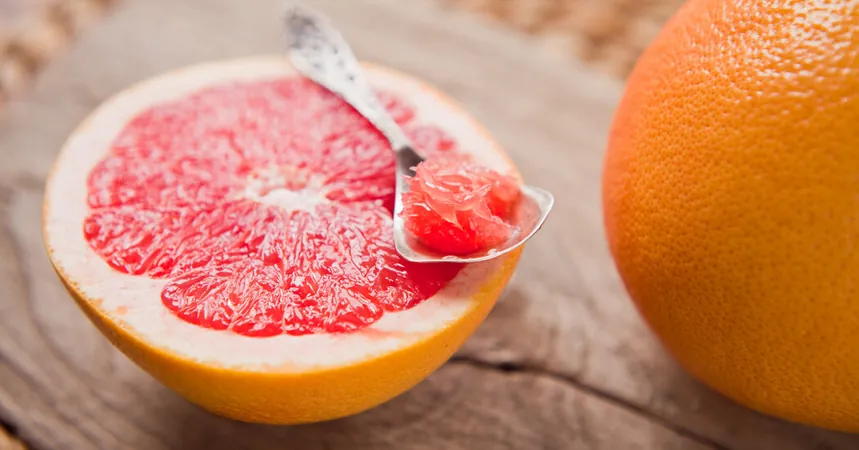
Breakthrough Discovery: Scientists Poised to Tame Grapefruit's Medication Interference!
2025-01-10
Author: Ming
So many people have come across the daunting caution on their medication labels: "Avoid grapefruit or grapefruit juice while using this medication." These warnings are not just mere suggestions—they concern numerous medications, including vital cancer drugs like docetaxel, antibiotics such as erythromycin, and statins that help manage cholesterol levels for more than a third of American adults over the age of 40.
The main culprit behind this alarming advisement comes from a group of compounds known as furanocoumarins. These pesky molecules wreak havoc on human liver enzymes and disrupt various bodily processes. When these substances are present, they can cause medications to accumulate in the bloodstream, leading to potentially dangerous side effects. Grapefruits and certain other citrus fruits are infamous for their high furanocoumarin content.
In light of this, researchers at the Volcani Center in Israel made a groundbreaking announcement that could change the game. In a recent study published in The New Phytologist, they revealed their success in cross-breeding mandarins with grapefruits to pinpoint the genetic factors responsible for furanocoumarin production. This vital research opens the door to the possibility of genetically modifying grapefruits to eliminate the need for the warning labels and make them compatible with essential medications.
For years, scientists have understood the basic structure of these problematic compounds and have mapped out a flowchart of their biosynthesis. However, the identities of the specific enzymes that facilitate this process remained a mystery—until now. Lead scientist Yoram Eyal explained, “Breeding varieties high in furanocoumarins with those low in these compounds could help identify the genes responsible.
After embarking on their ambitious study, researchers found a fascinating inheritance pattern when they analyzed the offspring of the mandarin-grapefruit cross. To their astonishment, half of the plants exhibited high levels of furanocoumarins, while the other half displayed none. This specific genetic signature offered key insights into how the ability to produce these substances is inherited.
Livnat Goldenberg, another researcher at the Volcani Center and lead author of the study, expressed excitement at their findings: “We identified a single gene responsible for this trait,” she remarked. The researchers pinned down the gene that influences furanocoumarin production, discovering it encodes an enzyme known as 2-oxoglutarate-dependent dioxygenase (2OGD).
Interestingly, mandarins possess a mutated version of this gene, which prevents the enzyme from functioning correctly. As a result, these fruits do not produce furanocoumarins in the same manner as grapefruits do, rendering them safe for use with medication.
Now, the research team is setting their sights on an exhilarating new venture: employing gene editing technology to modify grapefruit to contain the mandarin's non-functional gene, effectively curtailing furanocoumarin production. If successful, this initiative could revolutionize how grapefruits are consumed alongside prescription medications, paving the way for a healthier, safer option for those who enjoy this beloved citrus fruit.
The implications of this research extend beyond just grapefruit lovers. With medication safety margins potentially widened, millions could benefit from enjoying grapefruit without the fear of conflicting interactions. It’s a significant stride toward enhancing dietary options for those on medication—stay tuned for what the future holds!

 Brasil (PT)
Brasil (PT)
 Canada (EN)
Canada (EN)
 Chile (ES)
Chile (ES)
 Česko (CS)
Česko (CS)
 대한민국 (KO)
대한민국 (KO)
 España (ES)
España (ES)
 France (FR)
France (FR)
 Hong Kong (EN)
Hong Kong (EN)
 Italia (IT)
Italia (IT)
 日本 (JA)
日本 (JA)
 Magyarország (HU)
Magyarország (HU)
 Norge (NO)
Norge (NO)
 Polska (PL)
Polska (PL)
 Schweiz (DE)
Schweiz (DE)
 Singapore (EN)
Singapore (EN)
 Sverige (SV)
Sverige (SV)
 Suomi (FI)
Suomi (FI)
 Türkiye (TR)
Türkiye (TR)
 الإمارات العربية المتحدة (AR)
الإمارات العربية المتحدة (AR)